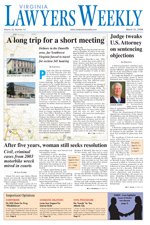Handed down a year ago, the decision in Ford Motor Co. v. Benitez was one of the top legal news stories in 2007. In Benitez, the Supreme Court of Virginia upheld a $2,000 sanction against a defense attorney who, after discovery and a nonsuit in a products liability case, continued to press affirmative defenses with no basis in fact or law.
The case left a lot of lawyers feeling like they were going to be poised between a waiver and a sanction, fearful of forfeiting an unpleaded claim or defense on the one hand, but afraid of sanctions for doubtful claims or defenses, on the other.
The balancing act continues.
The Benitez case was topic number one yesterday at the circuit court session of the Henrico County Bar Association Bench-Bar Conference at the courthouse.
The Henrico County bench thinks there may be Benitez-based sanctions motions on the horizon.
“I haven’t had one yet, but I can see it coming,” said Judge Al Harris. Both Harris and Judge Catherine Hammond said the nonsuit in Benitez was significant, but they also pointed to the mandatory language in Virginia’s sanctions statute, Va. Code § 8.01-271.1.
“Once the motion comes before the court, if the moving party establishes the failure to have a factual basis or legal basis, the court doesn’t have any choice,” Hammond said.
“The Supreme Court is very clear, it’s a ‘shall’ situation,” Harris said.
Judges on the panel said possible sanctions scenarios could include a contributory negligence defense asserted against a passenger injured in a car crash (a la Benitez), or a plaintiff’s request for punitive damages in a contract case, or a request for attorney’s fees and costs in a tort suit.
“The Supreme Court is placing a great burden on counsel to plead and develop the case,” said Judge Burnett Miller.
Several judges agreed that if pleadings are limited, lawyers likely will have more latitude in discovery.
The general district court session dealt primarily with collections work and the need for lawyers to clean up their cases ahead of time in order to streamline presentations in court.
But one GDC judge couldn’t resist getting in a dig on civil remedial fees.
General District Court Judge Neil Steverson said it was “good to see the circuit court judges over here getting CLE hours, since we were the ones who said civil remedial fees were wrong, and now the General Assembly is agreeing.”
Subscribe to:
Post Comments (Atom)

No comments:
Post a Comment